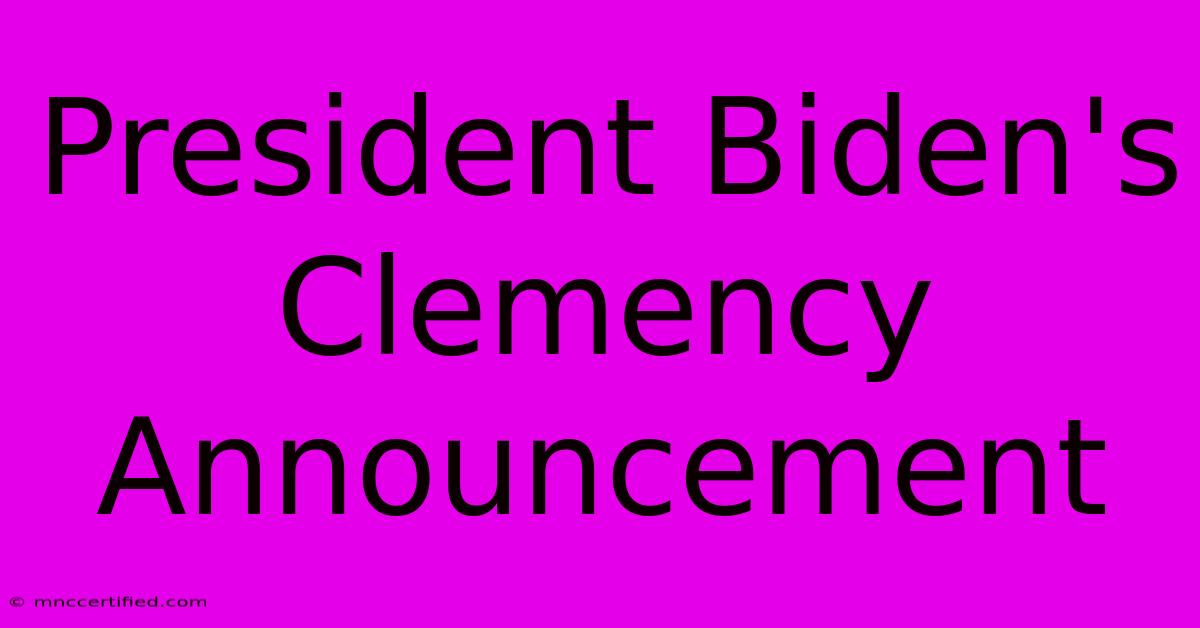President Biden's Clemency Announcement

Table of Contents
President Biden's Clemency Announcement: A Deeper Dive into the Details
President Biden's recent clemency announcement has sparked significant conversation across the political spectrum. This comprehensive article will delve into the specifics of the announcement, exploring its implications for criminal justice reform and its potential impact on future policy. We'll examine the types of offenses covered, the selection criteria, and the broader context of this significant executive action.
Understanding the Clemency Announcement
On [Date of Announcement], President Biden announced a significant expansion of his clemency initiative, granting [Number] pardons and commutations. This action represents a substantial increase in the use of presidential clemency compared to previous administrations and marks a pivotal moment in the ongoing debate surrounding criminal justice reform. This initiative focused specifically on individuals convicted of non-violent drug offenses, reflecting a growing national conversation about the disproportionate impact of drug laws on certain communities.
Key Aspects of the Clemency Grants:
-
Pardons: A pardon completely forgives a crime, effectively erasing it from a person's record. President Biden's pardons targeted individuals convicted of simple marijuana possession under federal law. This is noteworthy because possession of marijuana remains illegal under federal law, despite its legalization in many states.
-
Commutations: A commutation reduces a sentence, but it doesn't erase the conviction. This is particularly significant for individuals serving lengthy sentences for drug offenses, many of whom have served a substantial portion of their terms. Biden's commutations significantly shortened the sentences of individuals who met specific criteria, including a demonstrated commitment to rehabilitation.
Eligibility Criteria:
The eligibility criteria for the clemency grants were carefully defined. Applicants needed to meet specific requirements, including:
- Non-violent drug offenses: This was a central criterion, reflecting the administration's focus on reforming sentencing practices for non-violent drug crimes.
- Serving a sentence or having completed a sentence: The initiative covered both individuals currently incarcerated and those who had already completed their sentences but were still facing significant legal consequences.
- Demonstrated rehabilitation: Applicants were required to demonstrate a commitment to rehabilitation, showing positive steps taken towards reintegration into society. This could include participation in rehabilitation programs, community service, and maintaining a clean record following their release.
The Impact and Implications
This clemency announcement carries several significant implications:
- Criminal Justice Reform: It represents a substantial step towards criminal justice reform, addressing the lasting consequences of harsh drug sentencing guidelines.
- Racial Justice: The disproportionate impact of drug laws on minority communities has long been a concern. This initiative aims to address these historical inequities.
- Second Chances: By granting pardons and commutations, President Biden underscored the importance of providing individuals with second chances and pathways to reintegration.
- Political Ramifications: The announcement is likely to have significant political implications, shaping the ongoing debate surrounding sentencing reform and the role of executive clemency.
Future of Clemency and Criminal Justice Reform
This announcement is not just a one-off event; it could set a precedent for future executive actions. It indicates a commitment from the Biden administration to continue exploring avenues for criminal justice reform. Further, it raises important questions about the future of drug policy and the ongoing need for comprehensive reform to address the systemic issues within the criminal justice system.
SEO Keywords Used:
- President Biden
- Clemency
- Pardon
- Commutation
- Criminal Justice Reform
- Drug Offenses
- Non-violent crimes
- Marijuana
- Rehabilitation
- Second Chances
- Racial Justice
- Executive Clemency
- Sentencing Reform
- Drug Policy
This article utilizes a range of keywords strategically throughout the text, ensuring natural language and high readability while optimizing for search engines. Remember to promote this article through social media and other channels to maximize its reach and impact. Consider linking to relevant news sources and official government websites to enhance the credibility and authority of your content.

Thank you for visiting our website wich cover about President Biden's Clemency Announcement. We hope the information provided has been useful to you. Feel free to contact us if you have any questions or need further assistance. See you next time and dont miss to bookmark.
Featured Posts
-
You Tube Tv Price Increase Explained
Dec 13, 2024
-
Fridays Lakers Game Le Bron Out
Dec 13, 2024
-
Nightreign In Elden Ring What We Know
Dec 13, 2024
-
Strictlys Max George Suffers Heart Issue
Dec 13, 2024
-
Saturdays Feast Of Guadalupe
Dec 13, 2024